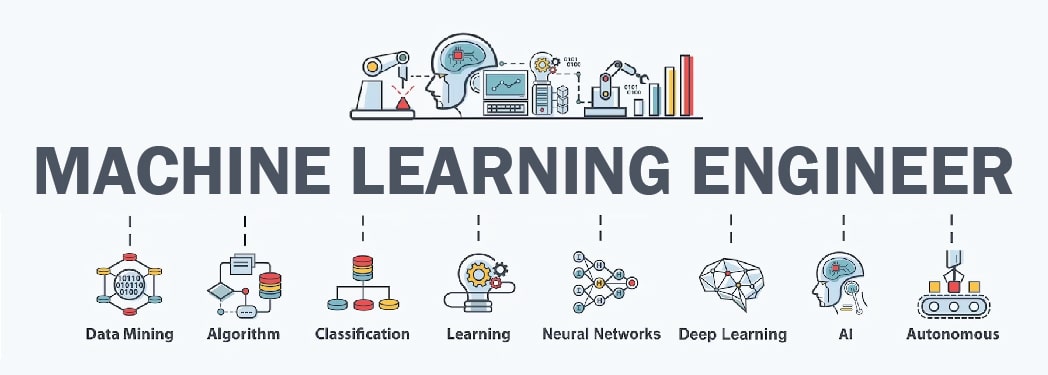Considering a Career as a Machine Learning Engineer?

In the rapidly advancing field of technology, a Machine Learning Engineer is a professional who specializes in crafting and implementing intricate algorithms that empower machines to learn and make decisions autonomously. This subsection seeks to define the pivotal role of a Machine Learning Engineer in the broader context of artificial intelligence.
Table of Contents
- Introduction
- 1.1 What is a Machine Learning Engineer?
- 1.2 What Does a Machine Learning Engineer do?
- Exploring the Role
- 2.1 Life as a Machine Learning Engineer
- 2.2 Skills and Qualifications required to become a Machine Learning Engineer
- Navigating Responsibilities
- 3.1 Machine Learning Engineer Roles and Responsibilities
Introduction
1.1 What is a Machine Learning Engineer?
In the rapidly advancing field of technology, a Machine Learning Engineer is a professional who specializes in crafting and implementing intricate algorithms that empower machines to learn and make decisions autonomously. This subsection seeks to define the pivotal role of a Machine Learning Engineer in the broader context of artificial intelligence. These engineers merge expertise in computer science, mathematics, and statistics to create systems capable of learning patterns from data, ultimately contributing to the development of intelligent and adaptive technologies.
Understanding the essence of what a Machine Learning Engineer is involves recognizing their ability to design algorithms that enable machines to evolve and improve their performance over time. Their work extends across various domains, from predictive modeling to complex decision-making processes, making them instrumental in driving the progression of technology toward smarter and more autonomous systems.
1.2 What Does a Machine Learning Engineer Do?
The responsibilities of a Machine Learning Engineer are diverse and dynamic, reflecting the evolving nature of the field. This subsection aims to illuminate the multifaceted tasks and roles undertaken by Machine Learning Engineers on a day-to-day basis.
At the core of their responsibilities lies the process of creating and refining machine learning models. This involves tasks such as data preprocessing, feature engineering, and selecting appropriate algorithms tailored to specific applications. Machine Learning Engineers continuously analyze and interpret data, identifying patterns that can be harnessed for predictive modeling.
Beyond model development, these professionals are involved in the critical stages of model evaluation and optimization. Rigorous testing against real-world data allows them to fine-tune algorithms for optimal performance. Collaboration with cross-functional teams, including data scientists and software engineers, is also a fundamental aspect of their role. Effective communication is key as they translate business objectives into machine learning solutions, ensuring that the developed models align with organizational goals.
In essence, a Machine Learning Engineer is a driving force behind the integration of intelligent systems into various aspects of our lives, shaping the technological landscape with innovation and foresight. This subsection will elaborate on these key aspects, providing a comprehensive understanding of the roles and contributions of a Machine Learning Engineer in the contemporary world of artificial intelligence.
Exploring the Role
2.1 Life as a Machine Learning Engineer
Embarking on a career as a Machine Learning Engineer offers a dynamic and intellectually stimulating journey. This section aims to provide insights into the daily life and experiences of these professionals, offering a glimpse into the challenges, rewards, and continual learning inherent in the role.
The Thrill of Problem Solving
Life as a Machine Learning Engineer involves tackling complex problems regularly. Whether it’s optimizing algorithms, enhancing model performance, or addressing real-world challenges, these professionals thrive on the thrill of problem-solving. Each day brings new puzzles to solve and innovative solutions to explore.
Collaborative Endeavors
Machine Learning Engineers seldom work in isolation. Collaboration is a cornerstone of their daily routine, involving interactions with data scientists, software engineers, and domain experts. This collaborative environment fosters a rich exchange of ideas and perspectives, enriching the overall creative process.
Continuous Learning
In a field that evolves at a rapid pace, staying updated is essential. Life as a Machine Learning Engineer is synonymous with continuous learning. Keeping abreast of the latest research, tools, and methodologies ensures that these professionals remain at the forefront of innovation, driving advancements in the application of machine learning.
Adapting to Change
The tech landscape is ever-changing, and Machine Learning Engineers embrace this fluidity. Adapting to new technologies, frameworks, and industry trends is part of their routine. This adaptability is crucial for staying relevant and ensuring that the solutions developed align with the current technological landscape.
2.2 Skills and Qualifications required to become a Machine Learning Engineer
Becoming a Machine Learning Engineer demands a specific set of skills and qualifications. This section will outline the key competencies and educational backgrounds required to thrive in this dynamic and challenging field.
Technical Proficiency
Machine Learning Engineers need a solid foundation in programming languages such as Python or R. Proficiency in machine learning libraries and frameworks, such as TensorFlow or PyTorch, is essential. Additionally, a strong understanding of algorithms, data structures, and statistical concepts is paramount for success.
Educational Background
While there is no one-size-fits-all educational path, a background in computer science, data science, or a related field is common. Many Machine Learning Engineers hold advanced degrees (Master’s or Ph.D.) with a focus on machine learning, artificial intelligence, or a related discipline.
Analytical and Problem-Solving Skills
Analytical thinking and problem-solving are at the core of a Machine Learning Engineer’s skill set. The ability to dissect complex problems, analyze data effectively, and derive meaningful insights is crucial for developing successful machine learning solutions.
Communication Skills
Effective communication is key for Machine Learning Engineers. They need to articulate their findings, insights, and solutions to diverse audiences, including non-technical stakeholders. This skill is vital for ensuring that machine learning projects align with business objectives and goals.
Passion for Learning
Given the ever-evolving nature of technology, a genuine passion for learning is a hallmark of successful Machine Learning Engineers. Whether it’s staying updated on the latest research papers or experimenting with new algorithms, a continuous thirst for knowledge is a distinguishing trait.
Navigating Responsibilities
3.1 Machine Learning Engineer Roles and Responsibilities
Machine Learning Engineers play a pivotal role in the development and deployment of intelligent systems. This section aims to provide a comprehensive overview of the key roles and responsibilities associated with this dynamic profession.
Designing and Implementing Algorithms
One of the primary responsibilities of a Machine Learning Engineer is to design and implement algorithms that enable machines to learn from data. This involves a deep understanding of mathematical concepts, statistical modeling, and a creative approach to solving complex problems. Engineers must choose and fine-tune algorithms to ensure optimal performance in specific applications.
Data Analysis and Preprocessing
Machine Learning Engineers work extensively with data, requiring them to conduct thorough analysis and preprocessing. This involves cleaning and transforming raw data into a format suitable for machine learning models. Engineers must possess a keen eye for patterns and anomalies, ensuring the quality and relevance of the data used in model training.
Model Evaluation and Optimization
Once models are developed, Machine Learning Engineers are responsible for evaluating their performance. This involves testing models against real-world data, identifying areas of improvement, and optimizing algorithms for enhanced accuracy and efficiency. Continuous refinement is crucial to ensure that models adapt to evolving datasets and changing conditions.
Collaboration with Cross-Functional Teams
In a collaborative environment, Machine Learning Engineers work closely with data scientists, software engineers, and domain experts. Effective communication is key as they translate business objectives into machine learning solutions. This collaborative approach ensures that machine learning projects align with organizational goals and contribute to overall success.
Deployment and Integration
Beyond model development, Machine Learning Engineers are involved in deploying and integrating machine learning solutions into existing systems. This requires a seamless transition from the development environment to real-world applications, addressing challenges related to scalability, reliability, and compatibility with diverse technologies.
Stay Updated on Industry Trends
The field of machine learning is dynamic, with continuous advancements and emerging technologies. Machine Learning Engineers must stay informed about the latest trends, methodologies, and tools. This ongoing learning process is essential to remain at the forefront of innovation and deliver state-of-the-art solutions.
In conclusion, the roles and responsibilities of Machine Learning Engineers are diverse and encompass the entire lifecycle of machine learning projects. From conceptualization to deployment, these professionals navigate a complex landscape, applying their expertise to drive technological innovation and contribute to the evolution of intelligent systems. Understanding and mastering these responsibilities are fundamental to excelling in the field of machine learning engineering.
In the rapidly advancing field of technology, a Machine Learning Engineer is a professional who specializes in crafting and implementing intricate algorithms that empower machines to learn and make decisions autonomously. This subsection seeks to define the pivotal role of a Machine Learning Engineer in the broader context of artificial intelligence.
Table of Contents
- Introduction
- 1.1 What is a Machine Learning Engineer?
- 1.2 What Does a Machine Learning Engineer do?
- Exploring the Role
- 2.1 Life as a Machine Learning Engineer
- 2.2 Skills and Qualifications required to become a Machine Learning Engineer
- Navigating Responsibilities
- 3.1 Machine Learning Engineer Roles and Responsibilities
Introduction
1.1 What is a Machine Learning Engineer?
In the rapidly advancing field of technology, a Machine Learning Engineer is a professional who specializes in crafting and implementing intricate algorithms that empower machines to learn and make decisions autonomously. This subsection seeks to define the pivotal role of a Machine Learning Engineer in the broader context of artificial intelligence. These engineers merge expertise in computer science, mathematics, and statistics to create systems capable of learning patterns from data, ultimately contributing to the development of intelligent and adaptive technologies.
Understanding the essence of what a Machine Learning Engineer is involves recognizing their ability to design algorithms that enable machines to evolve and improve their performance over time. Their work extends across various domains, from predictive modeling to complex decision-making processes, making them instrumental in driving the progression of technology toward smarter and more autonomous systems.
1.2 What Does a Machine Learning Engineer Do?
The responsibilities of a Machine Learning Engineer are diverse and dynamic, reflecting the evolving nature of the field. This subsection aims to illuminate the multifaceted tasks and roles undertaken by Machine Learning Engineers on a day-to-day basis.
At the core of their responsibilities lies the process of creating and refining machine learning models. This involves tasks such as data preprocessing, feature engineering, and selecting appropriate algorithms tailored to specific applications. Machine Learning Engineers continuously analyze and interpret data, identifying patterns that can be harnessed for predictive modeling.
Beyond model development, these professionals are involved in the critical stages of model evaluation and optimization. Rigorous testing against real-world data allows them to fine-tune algorithms for optimal performance. Collaboration with cross-functional teams, including data scientists and software engineers, is also a fundamental aspect of their role. Effective communication is key as they translate business objectives into machine learning solutions, ensuring that the developed models align with organizational goals.
In essence, a Machine Learning Engineer is a driving force behind the integration of intelligent systems into various aspects of our lives, shaping the technological landscape with innovation and foresight. This subsection will elaborate on these key aspects, providing a comprehensive understanding of the roles and contributions of a Machine Learning Engineer in the contemporary world of artificial intelligence.
Exploring the Role
2.1 Life as a Machine Learning Engineer
Embarking on a career as a Machine Learning Engineer offers a dynamic and intellectually stimulating journey. This section aims to provide insights into the daily life and experiences of these professionals, offering a glimpse into the challenges, rewards, and continual learning inherent in the role.
The Thrill of Problem Solving
Life as a Machine Learning Engineer involves tackling complex problems regularly. Whether it’s optimizing algorithms, enhancing model performance, or addressing real-world challenges, these professionals thrive on the thrill of problem-solving. Each day brings new puzzles to solve and innovative solutions to explore.
Collaborative Endeavors
Machine Learning Engineers seldom work in isolation. Collaboration is a cornerstone of their daily routine, involving interactions with data scientists, software engineers, and domain experts. This collaborative environment fosters a rich exchange of ideas and perspectives, enriching the overall creative process.
Continuous Learning
In a field that evolves at a rapid pace, staying updated is essential. Life as a Machine Learning Engineer is synonymous with continuous learning. Keeping abreast of the latest research, tools, and methodologies ensures that these professionals remain at the forefront of innovation, driving advancements in the application of machine learning.
Adapting to Change
The tech landscape is ever-changing, and Machine Learning Engineers embrace this fluidity. Adapting to new technologies, frameworks, and industry trends is part of their routine. This adaptability is crucial for staying relevant and ensuring that the solutions developed align with the current technological landscape.
2.2 Skills and Qualifications required to become a Machine Learning Engineer
Becoming a Machine Learning Engineer demands a specific set of skills and qualifications. This section will outline the key competencies and educational backgrounds required to thrive in this dynamic and challenging field.
Technical Proficiency
Machine Learning Engineers need a solid foundation in programming languages such as Python or R. Proficiency in machine learning libraries and frameworks, such as TensorFlow or PyTorch, is essential. Additionally, a strong understanding of algorithms, data structures, and statistical concepts is paramount for success.
Educational Background
While there is no one-size-fits-all educational path, a background in computer science, data science, or a related field is common. Many Machine Learning Engineers hold advanced degrees (Master’s or Ph.D.) with a focus on machine learning, artificial intelligence, or a related discipline.
Analytical and Problem-Solving Skills
Analytical thinking and problem-solving are at the core of a Machine Learning Engineer’s skill set. The ability to dissect complex problems, analyze data effectively, and derive meaningful insights is crucial for developing successful machine learning solutions.
Communication Skills
Effective communication is key for Machine Learning Engineers. They need to articulate their findings, insights, and solutions to diverse audiences, including non-technical stakeholders. This skill is vital for ensuring that machine learning projects align with business objectives and goals.
Passion for Learning
Given the ever-evolving nature of technology, a genuine passion for learning is a hallmark of successful Machine Learning Engineers. Whether it’s staying updated on the latest research papers or experimenting with new algorithms, a continuous thirst for knowledge is a distinguishing trait.
Navigating Responsibilities
3.1 Machine Learning Engineer Roles and Responsibilities
Machine Learning Engineers play a pivotal role in the development and deployment of intelligent systems. This section aims to provide a comprehensive overview of the key roles and responsibilities associated with this dynamic profession.
Designing and Implementing Algorithms
One of the primary responsibilities of a Machine Learning Engineer is to design and implement algorithms that enable machines to learn from data. This involves a deep understanding of mathematical concepts, statistical modeling, and a creative approach to solving complex problems. Engineers must choose and fine-tune algorithms to ensure optimal performance in specific applications.
Data Analysis and Preprocessing
Machine Learning Engineers work extensively with data, requiring them to conduct thorough analysis and preprocessing. This involves cleaning and transforming raw data into a format suitable for machine learning models. Engineers must possess a keen eye for patterns and anomalies, ensuring the quality and relevance of the data used in model training.
Model Evaluation and Optimization
Once models are developed, Machine Learning Engineers are responsible for evaluating their performance. This involves testing models against real-world data, identifying areas of improvement, and optimizing algorithms for enhanced accuracy and efficiency. Continuous refinement is crucial to ensure that models adapt to evolving datasets and changing conditions.
Collaboration with Cross-Functional Teams
In a collaborative environment, Machine Learning Engineers work closely with data scientists, software engineers, and domain experts. Effective communication is key as they translate business objectives into machine learning solutions. This collaborative approach ensures that machine learning projects align with organizational goals and contribute to overall success.
Deployment and Integration
Beyond model development, Machine Learning Engineers are involved in deploying and integrating machine learning solutions into existing systems. This requires a seamless transition from the development environment to real-world applications, addressing challenges related to scalability, reliability, and compatibility with diverse technologies.
Stay Updated on Industry Trends
The field of machine learning is dynamic, with continuous advancements and emerging technologies. Machine Learning Engineers must stay informed about the latest trends, methodologies, and tools. This ongoing learning process is essential to remain at the forefront of innovation and deliver state-of-the-art solutions.
In conclusion, the roles and responsibilities of Machine Learning Engineers are diverse and encompass the entire lifecycle of machine learning projects. From conceptualization to deployment, these professionals navigate a complex landscape, applying their expertise to drive technological innovation and contribute to the evolution of intelligent systems. Understanding and mastering these responsibilities are fundamental to excelling in the field of machine learning engineering.




























